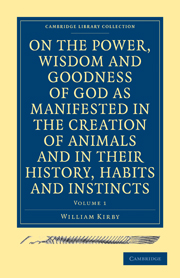Book contents
- Frontmatter
- Contents
- EXPLANATION OF PLATES
- INTRODUCTION
- CHAP. I Creation of Animals
- CHAP. II Geographical Distribution of Ditto
- CHAP. III General Functions and Instincts of Ditto
- CHAP. IV Functions and Instincts. Infusories
- CHAP. V Functions and Instincts. Polypes
- CHAP. VI Functions and Instincts. Radiaries
- CHAP. VII Functions and Instincts. Tunicaries
- CHAP. VIII Functions and Instincts. Bivalve Molluscans
- CHAP. IX Functions and Instincts. Univalve Molluscans
- CHAP. X Functions and Instincts. Cephalopods
- CHAP. XI Functions and Instincts. Worms
- CHAP. XII Functions and Instincts. Annelidans
- APPENDIX
- NOTES AND ILLUSTRATIONS
- Plate section
CHAP. XII - Functions and Instincts. Annelidans
Published online by Cambridge University Press: 29 August 2010
- Frontmatter
- Contents
- EXPLANATION OF PLATES
- INTRODUCTION
- CHAP. I Creation of Animals
- CHAP. II Geographical Distribution of Ditto
- CHAP. III General Functions and Instincts of Ditto
- CHAP. IV Functions and Instincts. Infusories
- CHAP. V Functions and Instincts. Polypes
- CHAP. VI Functions and Instincts. Radiaries
- CHAP. VII Functions and Instincts. Tunicaries
- CHAP. VIII Functions and Instincts. Bivalve Molluscans
- CHAP. IX Functions and Instincts. Univalve Molluscans
- CHAP. X Functions and Instincts. Cephalopods
- CHAP. XI Functions and Instincts. Worms
- CHAP. XII Functions and Instincts. Annelidans
- APPENDIX
- NOTES AND ILLUSTRATIONS
- Plate section
Summary
The animals we have just been considering form an almost insulated group, so that it seems not easy to say to what tribe they are most nearly related, but the soft Pseudo-leeches, as was observed above, especially those that have rudimental tentacles, seem to tend somewhat towards the molluscan tribes; they exhibit considerable resemblance to the blood-suckers or true leeches, and like them have an instrument of suction, though employed, perhaps, in extracting the sap or the blood of plants, and at the same time, in many respects, as we have lately seen, they approach the polypes.
The Flukes, likewise, appear to have some characters in common with the leech, so that a passage is open from the intestinal worms towards the Annelidans, some of which, as the earth-worm, occasionally become intestinal, and several are possessed of reproductive powers almost as great as those of the pseudo-leech, or the polype. I shall therefore next, in taking my departure from the worms, bend my steps to the animals just mentioned, which formerly bore the same general denomination.
They are called Annelidans, I suppose, because they appear to be divided into little rings, or else to have annular folds, and are soft vermiform animals, some naked, others inhabiting tubes, in some simply membranous, in others covered with agglutinated particles of sand, and in others formed, like those of the Molluscans, of shelly matter.
- Type
- Chapter
- Information
- On the Power, Wisdom and Goodness of God as Manifested in the Creation of Animals and in their History, Habits and Instincts , pp. 331 - 348Publisher: Cambridge University PressPrint publication year: 2009First published in: 1835



